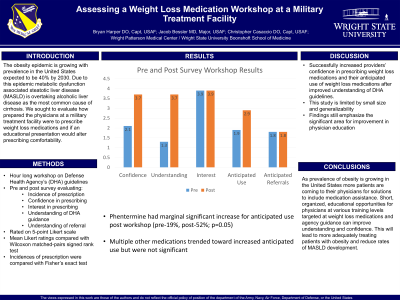Sunday Poster Session
Category: Obesity
P1454 - Assessing a Weight Loss Medication Workshop at a Military Treatment Facility
Sunday, October 27, 2024
3:30 PM - 7:00 PM ET
Location: Exhibit Hall E

Has Audio
- BH
Bryan Harper, DO
Wright State University Boonshoft School of Medicine, United States Air Force
Dayton, OH
Presenting Author(s)
Bryan Harper, DO1, Jacob Bessler, MD2, Christopher Casaccio, DO3
1Wright State University Boonshoft School of Medicine, United States Air Force, Dayton, OH; 2Wright Patterson Medical Center, Wright-Patterson AFB, OH; 3Wright-Patterson Medical Center, Wright-Patterson AFB, OH
Introduction: The obesity epidemic is growing with prevalence in the United States expected to be 40% by 2030. Due to this epidemic metabolic dysfunction associated steatotic liver disease (MASLD) is overtaking alcoholic liver disease as the most common cause of cirrhosis. We sought to evaluate how prepared the physicians at a military treatment facility were to prescribe weight loss medications and if an educational presentation would alter prescribing comfortability.
Methods: An hour-long workshop focused on the Defense Health Agency’s (DHA) guidelines for prescribing weight loss medications was provided to physicians at different levels of training. A pre and post survey was completed to evaluate their incidence of medication prescription, confidence and interest in prescribing, understanding of DHA guidance for prescribing, and referral to endocrinology for medication management using a 5-point Likert scale. Incidences of medication prescription were reported as binary. Likert scale ratings were reported as means and were compared with the Wilcoxon matched-pairs signed rank test. Incidences of weight loss medications were compared with the Fisher’s exact test.
Results: A total of 21 matched pre- and post- workshop survey responses were available for analysis. Participants felt obesity management was important before the workshop (3.7), but increasingly so post-workshop (4.1, p=0.02). Learners increased perceptions of confidence in weight loss prescribing (pre-2.1, post-3.5; p< 0.0001), understanding of DHA guidance (pre-1.3, post-3.7; p< 0.0001), anticipated use of weight loss medications (pre-1.9, post-2.9; p=0.001). Learners’ perceptions of interest in weight loss medications (pre-3.9, post-3.9; p=0.88) and anticipated referral frequency (pre-1.8, post-1.8; p >0.99) did not significantly change. Learners anticipated use of phentermine post-workshop had a marginal significant increase (pre-19%, post-52%; p=0.05) with a number needed to teach of 3. Multiple other medications trended towards but did not reach significance.
Discussion: The workshop successfully increased providers’ confidence in prescribing weight loss medications and their anticipated use of weight loss medications after improved understanding of DHA guidelines. This study is limited by small size and generalizability; however, it’s findings still emphasizes the significant area for improvement in physician education that could be expanded to better address the treatment of obesity and MASLD with weight loss medications.
Note: The table for this abstract can be viewed in the ePoster Gallery section of the ACG 2024 ePoster Site or in The American Journal of Gastroenterology's abstract supplement issue, both of which will be available starting October 27, 2024.
Disclosures:
Bryan Harper, DO1, Jacob Bessler, MD2, Christopher Casaccio, DO3. P1454 - Assessing a Weight Loss Medication Workshop at a Military Treatment Facility, ACG 2024 Annual Scientific Meeting Abstracts. Philadelphia, PA: American College of Gastroenterology.
1Wright State University Boonshoft School of Medicine, United States Air Force, Dayton, OH; 2Wright Patterson Medical Center, Wright-Patterson AFB, OH; 3Wright-Patterson Medical Center, Wright-Patterson AFB, OH
Introduction: The obesity epidemic is growing with prevalence in the United States expected to be 40% by 2030. Due to this epidemic metabolic dysfunction associated steatotic liver disease (MASLD) is overtaking alcoholic liver disease as the most common cause of cirrhosis. We sought to evaluate how prepared the physicians at a military treatment facility were to prescribe weight loss medications and if an educational presentation would alter prescribing comfortability.
Methods: An hour-long workshop focused on the Defense Health Agency’s (DHA) guidelines for prescribing weight loss medications was provided to physicians at different levels of training. A pre and post survey was completed to evaluate their incidence of medication prescription, confidence and interest in prescribing, understanding of DHA guidance for prescribing, and referral to endocrinology for medication management using a 5-point Likert scale. Incidences of medication prescription were reported as binary. Likert scale ratings were reported as means and were compared with the Wilcoxon matched-pairs signed rank test. Incidences of weight loss medications were compared with the Fisher’s exact test.
Results: A total of 21 matched pre- and post- workshop survey responses were available for analysis. Participants felt obesity management was important before the workshop (3.7), but increasingly so post-workshop (4.1, p=0.02). Learners increased perceptions of confidence in weight loss prescribing (pre-2.1, post-3.5; p< 0.0001), understanding of DHA guidance (pre-1.3, post-3.7; p< 0.0001), anticipated use of weight loss medications (pre-1.9, post-2.9; p=0.001). Learners’ perceptions of interest in weight loss medications (pre-3.9, post-3.9; p=0.88) and anticipated referral frequency (pre-1.8, post-1.8; p >0.99) did not significantly change. Learners anticipated use of phentermine post-workshop had a marginal significant increase (pre-19%, post-52%; p=0.05) with a number needed to teach of 3. Multiple other medications trended towards but did not reach significance.
Discussion: The workshop successfully increased providers’ confidence in prescribing weight loss medications and their anticipated use of weight loss medications after improved understanding of DHA guidelines. This study is limited by small size and generalizability; however, it’s findings still emphasizes the significant area for improvement in physician education that could be expanded to better address the treatment of obesity and MASLD with weight loss medications.
Note: The table for this abstract can be viewed in the ePoster Gallery section of the ACG 2024 ePoster Site or in The American Journal of Gastroenterology's abstract supplement issue, both of which will be available starting October 27, 2024.
Disclosures:
Bryan Harper indicated no relevant financial relationships.
Jacob Bessler indicated no relevant financial relationships.
Christopher Casaccio indicated no relevant financial relationships.
Bryan Harper, DO1, Jacob Bessler, MD2, Christopher Casaccio, DO3. P1454 - Assessing a Weight Loss Medication Workshop at a Military Treatment Facility, ACG 2024 Annual Scientific Meeting Abstracts. Philadelphia, PA: American College of Gastroenterology.
